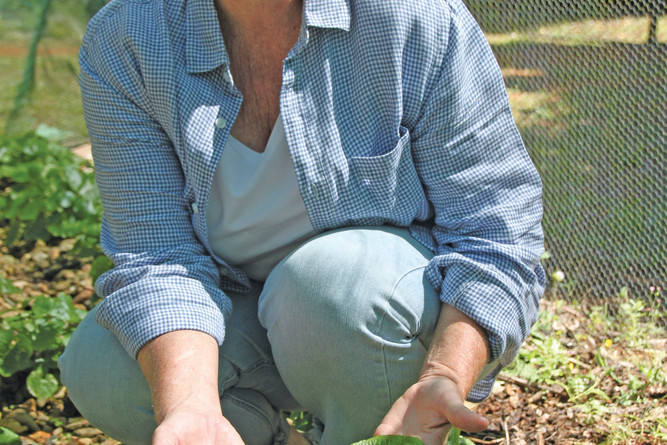General News
18 September, 2022
Ah Gee that's great wasabi
CONSIDERED by most experts to be the most difficult plant in the world to grow commercially, it stands to reason that wasabi (Wasabia japonica), should also be one of the most expensive, legally cultivated plants on the planet to buy.

Local organic market farmers Jamie and Annie Ah Gee of Ah Gee Farm near Lake Eacham have become the only growers to produce the plant in tropical North Queensland and have been fielding enquiries from buyers as far afield as Singapore and Hong Kong.
Jamie said Australian restaurants were happy just to be able to source the product and though it was hard to establish the plants and they took years to reach maturity in our climate, their sale price of $300 - $400/kg made it worth the effort.
“Each plant produces around 1-1.5kg of edible rhizomes and the whole plant is usable, so we are also able to sell the leaves for $1 each,” he said.
“We chill and cryovac the rhizomes and deliver them as quickly as possible as there is only a six-hour window before the plant deteriorates beyond use.”
Jamie and Annie's wasabi journey began 7-8 years ago when they were told wasabi seeds were impossible to source and even if they could find seeds, the crop was impossible to grow.
Such negative predictions served only to motivate the couple however and Jamie said it was “challenge accepted”.
“As a chef, I was aware that while everyone had heard of wasabi and probably thought they had eaten it on sushi, most people have never tried the real thing,” he said.
“That light, green paste in your sushi box is usually a mix of mustard, European horseradish and food colouring.”
In fact, it is estimated that only 5 per cent of the wasabi served in Japanese restaurants around the world comes from the actual plant.
The heat and flavour of the wasabi rhizome, lasts for only 10 to 15 minutes. For the genuine experience, a grater is sent to patrons' tables with a fresh wasabi root and the patron has the experience of grating their own.
“We started growing wasabi during the 18 months we spent near Kuranda, while we were searching for the right property to buy,” Jamie said.
“Two years ago, we bought 3.25ha of rich red soil bordered by a permanent creek and thick rainforest outside of Malanda – an absolute sanctuary.
“Our life here is a far cry from our hectic former existence. I worked for years as a chef in high end restaurants, hotels and cafes and Annie was working in the demanding environment of the sales world.
“Those jobs are okay if you have no family, but it’s hard to do both well.”
These days, their lives are filled with planting and pruning, picking and packing produce to fill orders for customers for local supermarkets, Tablelands and Cairns restaurants and local distributors like Tablelands to Tabletop.
"We use regenerative farming practices, favouring exclusion methods and biological controls over pest extermination,” Annie said.
“We don't even use approved organic chemicals on our food crops. We re-use, repurpose and recycle wherever possible throughout the farm.
“While we are best known for our wasabi, we also grow a range of herbs, leafy greens and edible flowers which we sell within a 50km radius to ensure freshness and keep our food miles down.
“Through deep mulching techniques, we have reduced our water usage by 90 per cent.
“Our business is totally demand-driven. We have quite a bit of room to expand here, but we don't want to create an oversupply of product. We plan to just grow along with our market.”
Jamie grew up on his family vineyard in country Victoria and though he did not follow the vintner path, he was growing small crops between the grape vines.
“I have always been associated with food and if we can just keep the scrub turkeys, bandicoots and grasshoppers off the wasabi plants, there is potentially a massive financial upside to this venture,” he said.
Annie's background, growing up with her parents' newsagency and book store in Broken Hill, in the far west of New South Wales, made farming a completely new experience for her.
“The green of the Tablelands spoke to me and I can't imagine ever wanting to leave here,” she said.
“I go out to check on the vegetables in the morning and just get lost in the garden for hours.
“Our small family farm is growing a variety of wasabi not seen anywhere else outside of Japan and prominent, former head chef of Melbourne's Poppy Cafe and Pantry, Alan Pickstock, recently said we are supplying some of the best fresh produce in the world.”


